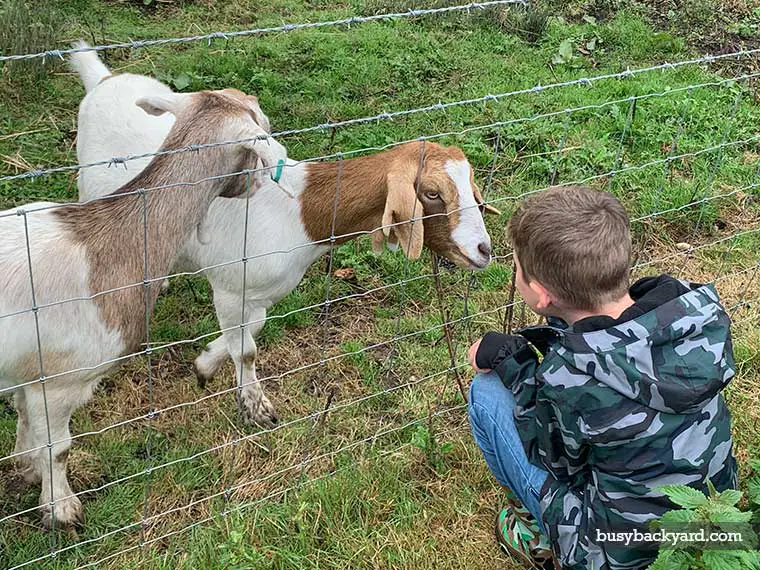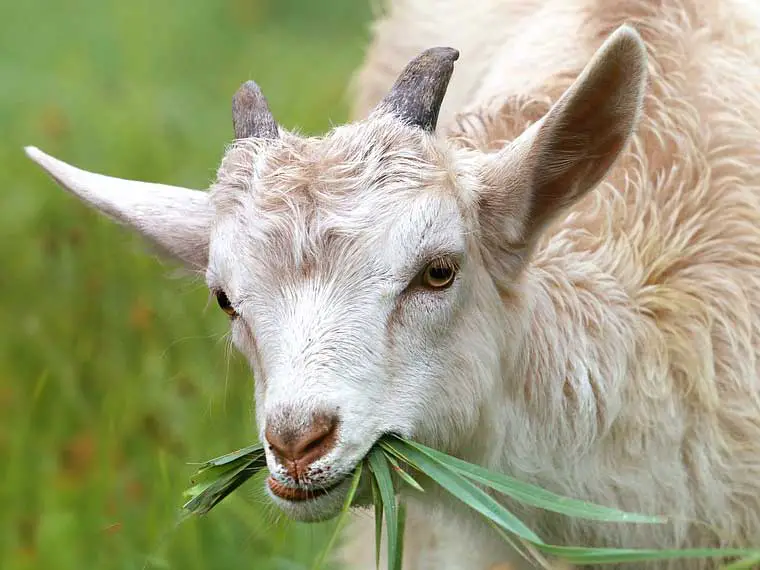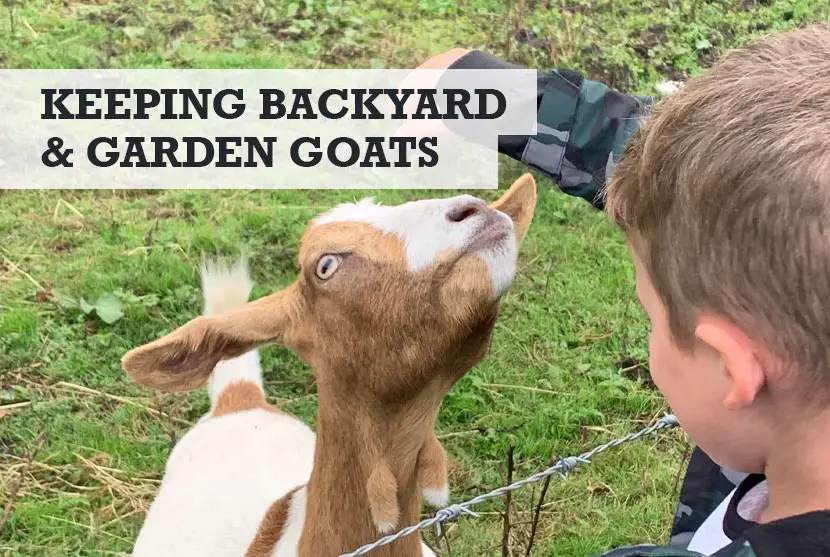Goats can make are sociable animals so can make for very lively pets. You can also drink their milk, and they are experts at shrub control. Based on that, it’s no wonder more people are considering keeping goats at home.
But, before you do that, you need to know the law and practicality around keeping goats in backyard or garden. Below I’ve outlined the legislation for both the United States and the UK, followed by some practical advice on raising goats in a residential neighborhood.
Do you need permission to keep goats?
Depending on where you live, will depend on whether you can keep goat at your home. Here’s a breakdown on what the rules or permission are depending on where you live.
Can I keep goats in my backyard in the United States?
Whilst it might be tempting to think that you can raise whatever live animals you won’t in your own backyard property, the truth is actually very different – and rightly so, because it concerns animal welfare and state to state legislation will differ.
That means that you can keeps goats in your backyard in some US states, but you will need to check your own state laws. It’s also worth knowing that some states will only allow you to keep a goat in your backyard depending on the size or weight of the goat.
Therefore, some people will keep a miniature goat in their backyard and not a larger one, because it will fall within their state’s law on keeping livestock in a residential neighborhood.
To conclude, before you rush out and buy a goat to live in your backyard, do your research please. I will leave the last word in this section to the Nolo legal guides website:
Unfortunately, there’s no one answer to this question. Each state and locality regulate farming in its own way. The answer will depend on whether your property is zoned as “residential” or “agricultural.” The first place to contact is your local zoning board or zoning office, which most cities or counties have some version of. They will be able to inform you about your property’s zoning.
Can you keep a goat in your garden in the UK?
In the UK, anybody can keep goats in their garden providing that they are not banned from keeping animals. There are also strict laws regarding the welfare and keep of goats, shoud you wish to raise them in your UK garden.

The RSPCA outline the laws for keeping goats in gardens as pets as follows:
- Goats must be fed a proper diet.
- Goats need somewhere suitable to live in your garden – e.g., adequate shelter and warmth.
- Goats should be allowed to express normal behaviour.
- Goats require protection from and treatment of illness and injury.
You can read the law in more detail on the UK Government website’s section on the Animal Welfare Act of 2006.
But the UK law does not stop there. If you want to keep a goat in your garden in England, Wales, Northern Ireland, or Scotland, you need to adhere to additional legislation too. This is because goats are classed as farm animals, even if kept in a residential neighborhood.
That means you will also need to:
- Be able to correctly identify any goats on your property.
- Register the garden and land upon which the goats reside.
- Be aware of the law regarding transportation of live animals.
- Keep medical records of any goats kept in your garden.
There’s quite a significant amount to it, all of which can be accessed on the Defra website.
So those are the very basic rules about the permission you need to keep goats depending on where you live. Here are a few supplementary notes, then further down I will explain the practicalities of keeping goats in a backyard or garden space.
Can you keep a miniature goat in your backyard?
Yes, you can keep a miniature goat in your backyard in certain US states. In fact, a miniature goat might be the only type of goat you can keep, as many states have laws regarding the size and weight of livestock you can keep in backyards.
Can you keep a pygmy goat in your garden?
You can keep pygmy goats in a UK garden, but providing you follow the laws set out in the 2006 Animal Welfare Act. You should also keep more than one, as pygmy goats want to live in a herd and will be very unhappy if kept alone in a garden.
How much land do you need for goats?
Backyard goats need approximately 30 to 50 square feet for grazing. If you were to keep a herd of goats, an acre of land can accommodate 6 to 8 animals.
Their shelters will also need to be considered. If given in separate pens, each goat will need about 4 square meters of floor space for rest and shelter.

Do goats make good backyard pets?
If you are happy that legally it’s ok for goats to live in your backyard or garden, then this is where reality needs bite about whether it’s the best idea for you… and the goats.
There are many factors to consider before you buy goats to live in your backyard. Your area needs to have the correct zoning, your neighbors will need to be happy about you raising backyard goats and you need to ensure they cannot escape or come to harm.
Other things that need to be taken into consideration, are the time, effort, cost and space required to keep goats. If all these issues can be resolved, you might soon join the ranks of the goat converts.
But, with that to one side, are goats good backyard pets? Here’s what you will need to consider.
1. They are sociable
Goats are herd animals. They need company. They could find happiness in a household of dogs and cats, and even make friends easily with horses and other livestock but they are only really fulfilled in the company of other goats.
You will need to acquire at least two goats to live in your backyard, preferably three or more. Goats, like other pets and humans, have different temperaments so it would be to their advantage to offer them a choice of companions.
2. They are adventurous
Before they were domesticated, goats roamed free in the mountains. Despite centuries of breeding for domesticity, they have retained their desire for freedom, and the ability to jump and climb to attain it.
It takes a strong fence, skilfully erected, to hold a determined goat in. Many owners have resorted to installing electrified fencing. The fence needs to be at least five foot high and, of the type that does not afford a goat a foothold.
Also make sure that there are no structures near the fence that can be used as a springboard to the outside world.
Be aware that any structures within the fenced area are fair game. They will jump in or on your car, and come inside your house and cause havoc, if they have access.
Your goats will enjoy a playground of different structures, heights, and obstacle courses, on which to practise their agility.
On some farms in the Mediterranean region, multistorey circular goat towers were built with ramps spiralling down the sides. These have become tourist attractions and have been copied around the world.
3. They are picky eaters
Goats have a reputation for scavenging and eating just about anything. They will do a fair amount of damage if they have access to your washing hanging out to dry.
There are two common erroneous trains of thought that pertain to goats. Firstly, they will not replace the need to mow your lawn in your garden. They are not grazers, like sheep.
They are browsers and prefer to eat leaves off shrubs and trees. They prefer hay to fresh grass so you can feed them the grass cuttings once you have mowed.
They are also not like pigs, who act as mammalian garbage disposal units. Goats do enjoy pips and the skins of fruit, including bananas and orange peels. They will eat much of what would normally end up in the compost bin in your backyard.
Like most animals, they would probably sell their souls for sweet treats but these have the same harmful effects on their systems as they have on humans. Your goats can put on weight and possibly develop digestive and metabolic health problems as a result.
4. They cannot be house trained
Goats eliminate bodily waste indiscriminately. You will find pee and poop in their bedding, on their climbing apparatus and even in their food bowls and water source.
They are primarily livestock animals, and unless you are willing to spend hours training them, they will not make hygienic house pets. Leave them in your garden or backyard, don’t bring them indoors.
Their bedding needs to be changed regularly or augmented with straw and treated with lime as a disinfectant. The plus side is that goat manure is eventually good for the garden, once it has been composted.
5. They can be smelly
Unneutered male goats, known as ‘bucks’, employ a variety of obnoxious scents in order to make themselves attractive to the females, who are known as ‘does’. In rutting season, they emit a pungent, musky odour.
If they really want to go on the charm offensive, bucks will bathe their faces in urine, an ancient goat tradition that never fails to turn a female’s head.
Unfortunately, unlike the buck himself, the smell cannot be contained within your fences. Your neighbours might not find it quite as attractive as your goat’s paramours, so consider positioning your goat enclosure downwind from any human habitation.
It is best to keep females and neutered males, also known as ‘wethers’. You can always hire the services of a buck, temporarily, to service your does.
6. They can be noisy
Goats are vocal creatures and bleat to communicate. They will let everyone know if they are hungry, sick, alarmed or calling their young. The cry of a little kids can often be mistaken for a human distress call.
Goats cannot be trained to keep quiet when it is inconvenient for you or your neighbors. They will sometimes complain for hours, when they are waiting for food, which can become a public nuisance.
Some breeds, like the pygmy and Nigerian Dwarf varieties bleat less stridently than standard sized goats.
This will be one of the biggest considerations for keeping goats in your backyard or garden: will it mean you become the scourge of the local neighborhood?
How to keep goats in your backyard
If you’ve now made your mind up and want to go ahead, here are the essentials you will need to have to keep them healthy and safe.
1. Space, shelter and fencing
Each goat needs approximately 50 square feet of space as they are active creatures. As outlined above, this space should have adequate fencing and climbing apparatuses, to keep the goats corralled and occupied.
Goats require enclosed, sheltered sleeping quarters in your backyard that give them a sense of security. This should be close to other livestock or the house. They believe there is safety in numbers in the likelihood of attacks by predators.
Goats are less tolerant to cold, wet conditions than sheep, cattle, and most other livestock. Their coats do not offer as much insulation against rain, especially when it is cold. In addition to overnight shelter, the herd will need daytime cover.
2. Time and attention
Goats may take some time to get acquainted with you but once they have, they will vie for your attention and look forward to your visits. They enjoy being groomed and this will strengthen your bond with them.
Time is needed to ensure that they are well fed and have adequate water. You also need to set aside time daily, to muck out their sleeping quarters or to dress it with fresh straw.
Some goats are kept for their production capability. Time is needed to milk them or to harvest their fur. If you are keeping goats for showing or breeding, this will require a great deal of focus and attention.
Goats need to be monitored for diseases, parasites, and illness. Sick goats lose weight and much needed body fat which regulates their body temperature.
Goats live for 12 to 15 years so time with your animals needs to be measured in years as well as hours in the day. A substantial commitment is required.
3. Access to veterinary support
There are few vets that specialise in treating goats, especially in an urban environment. It pays to seek out one who understands all their peculiarities, and the health issues associated with the species.
If you have a herd of goats, you could be faced with a sizeable vet’s bill. You will need to budget for, or insure against, these costs.
Possible problems associated with keeping goats in a garden
If your goats are well fed and entertained, have adequate shelter, and can’t escape their enclosure, there are two additional issues that you need to be aware of.
1. Zoning
Getting to grips with the zoning regularities in your area could be tricky. If your land is deemed to be residential, there may be restrictions on the kind of livestock you may keep.
Indeed, if you are permitted to keep goats, there may be limits on what breeds are allowed.
Be aware that zoning laws may differ between municipal and district authorities. They may even change from street to street. There could be old statutes that not commonly used but that could still be binding in the case of a dispute.
It is best to understand all the nuances before investing in the animals and infrastructure you require.
2. Neighbor complaints
Most zoning regulations are in force to preserve neighborly relations. You may find that others in the immediate vicinity do not share your attraction to goats.
Neighborhoods change over time and the tolerance for urban homesteads fluctuates. You need to keep your neighbours informed about your activities and be sensitive to their attitudes towards your goat rearing venture.
Conclusion
Keeping goats can be hugely rewarding, but it comes with a big commitment. Unless you are prepared to work hard, and keep the goats for their lifespan of up to 15 years, please don’t even considering raising them in your own backyard.

